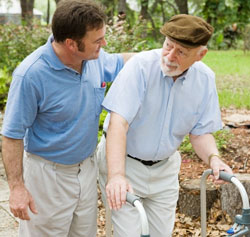
According to the National Alliance for Caregiving, the majority of senior care given in the United States is provided by family caregivers just like you. Whether you’re running home during your lunch break to take your father to his doctor’s appointment or rearranging your entire life to accommodate the daily care needed by a loved one. You are one of more than 44 million hardworking adults that “make up the backbone of the… long-term care system” for older adults in the United States.
When you’re putting so much effort into making sure that your loved one stays happy and healthy, it can be a struggle to remember to take care of your own needs.
It’s easy to get burned out as a caregiver if you’re on call 24/7 without any time for yourself, and caregiving takes on special challenges when you must also provide memory support for a senior with Alzheimer’s or dementia.
If you’ve been caring for a parent or other loved one with Alzheimer’s, it’s important to know that you aren’t alone.
Dementia and Alzheimer’s in Ohio
National data collected by the Alzheimer’s Association offer a state by state comparison of the prevalence and impact of Alzheimer’s in the United States.
With the number of adults over the age of 65 rising year over year, we’ve seen a corresponding increase in the number of adults with Alzheimer’s and dementia—both in our state and at a national level.
In Ohio, we rank sixth when it comes to commonness of Alzheimer’s within the senior population.
With more than 230,000 Alzheimer’s patients recorded last year, we fall behind only the more populous states of California (480,000), Florida (450,000), Texas (340,000), New York (320,000), and Pennsylvania (280,000).
Professional Memory Support and Dementia Care throughout the State
 Many seniors who are diagnosed with Alzheimer’s will receive care from a skilled nursing facility at some point during the progression of their disease—most typically in homecare services, adult day care, or temporary respite programs.
Many seniors who are diagnosed with Alzheimer’s will receive care from a skilled nursing facility at some point during the progression of their disease—most typically in homecare services, adult day care, or temporary respite programs.
A surprisingly small number of seniors with Alzheimer’s disease live at a nursing home full time.
In 2009, there are about 190,000 older adults living in nursing homes throughout the state of Ohio. According to the Alzheimer’s Association, the majority of those residents did not enter the facility for memory support services.
- Only about 42% of all residents exhibit the moderate or severe cognitive impairment of full-blown Alzheimer’s disease.
- The greater majority of nursing home residents, about 57%, show little to no symptoms of cognitive decline. Only 27% of all residents have mild cognitive decline and about 30% have no cognitive impairment at all.
If not even 100,000 of Ohio’s nursing home residents are dementia patients, who, then, is providing care for the majority of our state’s 230,000 seniors with Alzheimer’s?
The short answer is you and people like you.
Alzheimer’s Care in the Community
When it comes to caring for our beloved elders, in following with the general trend of senior care, the bulk of the caregiving burden has been taken up by family or friends.
“An estimated 60 to 70 percent of older adults with Alzheimer’s disease and other types of dementia live in the community,” reports the Alzheimer’s Association.
In 2012, Ohio boasted some 586,878 volunteer caregivers who worked nearly 670 million hours providing $8,100,243,871 worth of care.
Even those older adults who do receive professional care generally have a family caregiver, too.
“Fewer than 10% of older adults receive all of their care from paid workers,” says the American Alzheimer’s Association. Upwards of 80% of all care that a senior with Alzheimer’s or some other form of dementia receives at home is provided by a family member or close friend.
Support for the Caregiver
If you’re one of the many adults in southern Ohio providing care for a loved one with dementia, you don’t have to go it alone.
- Utilize senior services in your community. Episcopal Retirement Homes offers a geriatric care management program that can help you get in touch with the resources you need to keep your loved one happy and safe at home without over-taxing your ability to provide care.
- Find a support group. The Greater Cincinnati Chapter of the Alzheimer’s Association can help you connect with other local caregivers who understand and sympathize with your struggles and little victories.
- Look into full time care. If you’re worried that you aren’t able to provide the level of care your loved one needs, Marjorie P. Lee’s Assisted Living with Memory Support could be the answer.
No matter what caregiving choices you make, make sure their decisions that ensure both you and your loved one keep living well.
Image credit: lisafx / 123RF Stock Photo
Image credit: ginasanders / 123RF Stock Photo












